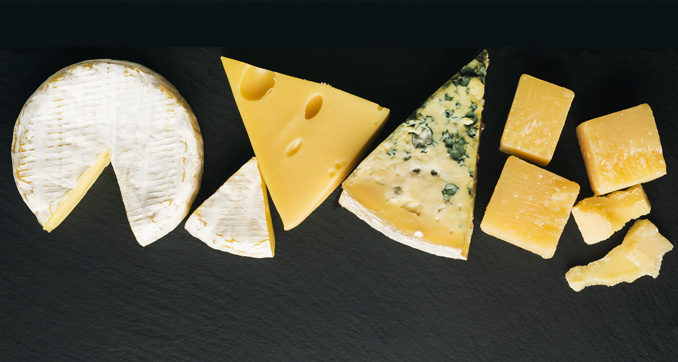
From milk to market, we learn the art of crafting exquisite cheese
Prepare yourselves, my foodie friends. Because today we’re going on a journey through the rich and rewarding world of cheese. That’s right! Those expertly crafted artisan wheels didn’t magically appear in your favorite downtown market or corner shop. Each bite of brie on your dessert platter and fork-full of feta found in your salad was developed with your taste buds in mind.
Are your saliva-glands all aquiver? Because here in California, we’re second only to the state of Wisconsin in our passion for fromage! Taking the silver medal for largest producer of cheese in the country, we churn out more than 250 different varieties, two of which call our ocean-side state home! Monterey Jack’s origin story started in the missions dotting California, and I’m sure you can guess how San Joaquin Gold got its name.
As you can plainly see, Wisconsin isn’t the only state brimming with Cheese Heads! The addicting flavor populates the hearts of cheese makers across our Golden State. And because our unique cheese trail runs straight through our Central Valley, we just had to have a chat with a few of these local crafting experts! Read on and discover how some of your favorite blends made their way onto cheese platters, party plates, and more.
Every journey must have a beginning, and ours starts with milk! Although several unique blends (ready to try reindeer, moose, or camel?) are developed into cheese across the world, California typically works with cow, goat, and sheep. Cow milk is known to be a smooth talker for the taste buds, while goat milk can be strikingly tangy. And sheep? Their milk is high in both fat and protein, which makes for a rich, buttery taste.
But make no mistake! How the milk is handled throughout the process impacts how strong, or mild, the cheese will be. “We handle the milk as gently as possible and chill it quickly after milking,” Owner of Lodi’s Spenker Artisan Creamery LLC, Betty Ann Spenker, says of their creamy chevre. “Attention to detail keeps the milk from acquiring that objectionable “goaty” flavor, and our goats produce milk high in butterfat, which makes it extra creamy.”
Cheese makers that outsource their milk, like Oakdale Cheese and Specialties, team with local dairy farms that produce specifically for cheese making. Others—such as Nicolau Farms in Modesto, Fiscalini Farms in Salida, and Stuyt Dairy Farmstead Cheese Company in Escalon—boast on-site dairy production. These specialty businesses are known as farmsteads, and have gone through rigorous site-checks and classes, ensuring each batch of cheese made meets all health standards. “Because we are producing cheese in the same place our milk is produced,” says Walter Nicolau, of Nicolau Farms. “We label our goat cheeses as artisanal farmstead and we label our mixed milk cheeses as artisan.”
The milk, either delivered or produced on property, is sent into large holding vats which act as catalysts in all cheese crafting! “[For us], the entire cheese making process takes about nine hours,” Laura Genasci of Fiscalini Farms explains. “Cheese cultures—good bacteria strains that work together to convert lactose to lactic acid that makes for a more flavorful cheese—rennet, and salt, are added to the vat as specific steps like stirring, cutting, and turning are performed to create proper curd formation.” Once the curd has developed, watery milk remains (known as whey) are drained, and the cheese takes one final tossing.
As a raw milk farmstead, Ansally Stuyt of Stuyt Dairy Farmstead Cheese Company explains that their milk is not pasteurized, “A mandatory, 60-day ageing is required. However, we like to age for 90-120 days because we’ve found that timeframe to produce our favorite flavor!”
Once the cheese is ready to leave the safety of the vats, its destiny is largely determined by what’s being made. Soft cheese (much like Nicolau Farm’s fresh chevre) is ready for any final prepping before being packaged. But cheese that requires aging is mercilessly crammed into plastic molds used to give the cheese its well-known wheel shape! Some wheels may tap-in at over 20 pounds at the beginning, but as the curds lose excess whey, they solidify. Many types of cheese, like gouda, are sealed in their plastic molds and then placed under a pressing machine to remove any last droplets of whey. Talk about a tight squeeze!
If that wasn’t torture enough for our favorite fromage, these delectable bites must then take the plunge into cheesy maturity by building their rinds. Rinds are the exterior shells that encase cheese as they mature, ensuring that the interior of each wheel ages properly. Bloomy rinds are those soft, fuzz-like cheese exteriors found on camembert or many of Spenker Artisan Creamery’s specialty bloomy-rind cheese. Traditional cheddars and Lancashire (sometimes covered with a special cloth or type of leaf) welcome nature to, for the most part, take control—thus, their rind is fittingly titled “natural”.
Many types of cheese—like the Gouda from Oakdale Cheese & Specialties—is given a special bath in heavily salted water called a brine, that promotes a strong flavor. After its lengthy transition from milk to curds, and finally proud wheel, the cheese is placed into storage that’s set at just the right temperature for its type. It is then monitored over the following months and flipped, wiped down, or handled according to its special needs. Much like that of a fussy child. Father time coaxes the cheese into further developing its own texture, flavor, and unique scent—whether our coddled cheese breaks down into ooey-gooey bliss, or continues to lose moisture and harden into the parmigiano-reggiano we always knew it could be.
Bound for market, the wheels are typically sliced up and sold in those cute wedges we all adore taking to holiday dinner parties!
Nicolau Farms
Modesto, Ca
Goat, Mixed Cow & Goat Milk
100 % Goat Feta, Bianchina, Black Truffle Casiago, Cabranet, Calabrian Chili Casiago, Capra Stanislaus, Casiago, Fresh Chevre, Quatro Pepe, Tartufina
Sold through website, local farmers’ markets
NicolauFarms.com
Oakdale Cheese & Specialties
Oakdale, Ca
Cow Milk
Gouda: Mild, Aged, Smoked, Garlic, Garlic Basil, Garden Herb, Cumin, Jalapeno, Mediterranean, & Black Pepper. White Cheddar, Edam and Quark.
Sold on website, local farmers markets
OakdaleCheese.com
Fiscalini Cheese Company
Salida, Ca
Cow Milk
Bandage Wrapped Cheddar, San Joaquin Gold, Lionza, Traditional Cheddar, Purple Moon, Habanero Cheddar, Onion and Chive Cheddar, Pumpkin Spice Cheddar, Smoked Cheddar, Hopscotch, Horseradish Cheddar, Scamorza.
Sold on website, on site, O’Brian’s Market, Save Mart, Raley’s, Safeway
FiscaliniCheese.com
Stuyt Dairy Farmstead Cheese Company
Escalon, Ca
Cow Milk
Gouda: Cumin, Smoked, Smoked Cumin, Garlic Herb, Onion Parsley, Bacon, Red Pepper, Chipotle, Jalapeno and Habanero
Sold on site, Nugget Markets, Save Mart, & O’Brian’s Market, Mar-Val
Spenker Artisan Creamery LLC
Lodi, Ca
Goat Milk
Chevre, Bloomy Rind Cheese
Sold on site, farmers markets, Cheese Central




